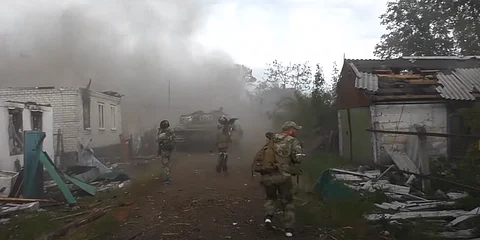

On Friday in St. Petersburg, Steve Witkoff, special envoy of U.S. President Donald Trump, met with Russian President Vladimir Putin to discuss possibilities to end the war in Ukraine. This was the third meeting between the two this year and discussions revolved around potential peace deals and areas of cooperation, including joint investment in rare earth minerals and Arctic resources. State TV featured Putin welcoming Witkoff at a presidential library, whereas Russian media also reported Witkoff's earlier departure from the hotel he was staying at with Kirill Dmitriev, who is an investment advisor to Putin.
"Get Moving": Trump to Russia
Trump has become frustrated at the slow movement towards a ceasefire, announcing potential secondary sanctions against countries purchasing Russian oil if the talks are delayed any longer. He stated on Truth Social on Friday that "Russia has to get moving. Too many people are DYING ... in a terrible and senseless war." He reiterated claims that this conflict would not have occurred if he was still President. Putin stated that he is open to a ceasefire if a few of the outstanding issues - Ukraine's NATO membership, limits to their military, and Russia's claims to the four regions of Ukraine - can be resolved.
The Peace Terms
Russia possesses a firm control over approximately 20% of Ukraine and is still pushing forward on the battlefield, strengthening the Kremlin's negotiating position. Putin insists that Ukraine give up its NATO aspirations, curtail its armed forces, and release territories that are culturally and ethnically Russian claims although, currently it does completely control some of these territories. To this, Kiev has pushed back by calling these terms “capitulation,” stating that Russia is using negotiations as a tool to legitimize its occupation. Furthermore, both sides are accusing the other of violating a temporary agreement, to refrain from attacks on energy infrastructure.
Trump and Putin: A Summit?
Dmitry Peskov, spokesperson for the Kremlin, stated that these negotiations might also involve organizing a direct meeting between Putin and Trump, who have only spoken on the phone since Trump returned to office. Peskov pushed back on any expectations of possibilities, labeling the discussions as normal and saying they are "not going to produce results". He reiterated that Russia would set forth its "concerns", which likely pertained to U.S. sanctions imposed on Russia, and U.S. support for Ukraine as a non NATO ally of the U.S.
Prisoner Exchanges and Humanitarian Missions
In the past few months, cooperation has been minimal, including prisoner exchanges. In February, Witkoff came back to the United States with Marc Fogel, a teacher who was imprisoned in Russia. On Thursday, Ksenia Karelina, a Russian-American worker at a spa who was sentenced to twelve years in prison, was swapped for Arthur Petrov, whom the United States accused of smuggling electronics to use in the Russian military. While these moves indicate the relationship is warming, they are still singular events in the generally stagnant response to Ukraine.
Other U.S. Diplomatic Challenges
The discussions take place against the backdrop of increased tensions between the U.S. and Russia's allies, Iran and China. On Saturday, Witkoff is expected to meet with Iranian officials in Oman to talk about Tehran's nuclear program, a target that Trump has threatened to use military action against. Separately, U.S.-Russia talks in Istanbul were said to have progressed toward returning to normal diplomacy this week, a very small step in improving relations severed by the war in Ukraine and mutual sanctions.